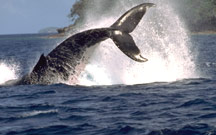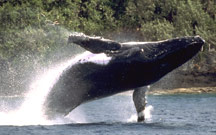“All in one PARADISE sea adventure with WHALES”
July-October
Eoc-Friendly Whale Watching And Whaleswim tours
Melinda Sea Adventures offers the only live-aboard whale watching tours in Vava'u. Our sailing yachts are comfortable and stable and give you the opprtunity to be totally immersed with the whales. From our reviews: "Melinda Sea Adventures gave a very knowledgeable briefing. They work closely with research groups and have up-to-date information on whale movements and behaviour. We saw single whales, mother and calf pairs, groups of 7-10. One night a singer spent the night beneath the yacht and sang to us most of the the night."
Most of our guests spend from 3-6 nights onboard our comfortable yachts. Meals are delicious with an emphasis on heathly fresh vegetables, fruits and fish. Evenings can be spent reviewing photos from the day, learning more about the whales, or just relaxing under the stars..
Humpback whales in Tonga Islands
With
an explosion of energy, a humpback whale raises her 40 tonnes out
of the water next to the boat, then pauses for a pirouettte before
crashing back into the sea, leaving us with our mouths hanging open
in awe. We are lulled by the steady motion of the boat and the silence
of sailing. Watching the aerial show is as spellbinding as having
extraterrestrials land on your doorstep. Accommodation onboard one of our beautiful
sailing yachts is the perfect way to see the Tonga whales in
the tranquil and unspoiled enviroment of the Tonga islands, anchoring overnight
at uninhabited islands close to the tonga whales. There is opportunity
to explore the island and snorkel at each anchorage.
Humpback
whales have visited Vava'u for millenia. They migrate from their
summer feeding grounds in Antarctica to winter breeding and birthing
grounds in Tonga's warm tropical waters. The whales start arriving
in June, and most new calves are born between July and September.
Boisterious courtship displays, male competition, and mothers caring
for their calves make this an exciting time to be watching whales
in Tonga.
By October many of the new calves are old enough to travel, and
by November, most of the whales have left the Tonga islands to begin their journey
south to the nutrient-rich waters of Antarctica where the whales
gorge themselves on krill.
They do not feed on their winter breeding grounds and must subsist
on fat reserves stored in their blubber through the season.
Tonga
Whale Watching Regulations
Other
links:
Save
the Whales sign a petition
The
Great Whale Trail
Ocean
Alliance
Sea
Sheperd |
 |
 |
| |
Protecting
the Whales
Today,
in most areas, humpback whales are protected but that has not always
been the case. l9th Century whalers slaughtered the whales in great
numbers in the Tonga islands, other South Pacific Islands and in the Antarctic.
Over 200,000 Southern Hemisphere humpbacks were killed from l904
until l963, when Southern Hemisphere humpback whales were protected
from commercial whaling. Tongan whaling ended in l978 when a moratorium
was imposed by Royal decree. Since l99l, Tongan humpback whales
have been studied and monitored by University of Auckland research
teams. The researchers have identified and catalogued over 400 individuals
to date. But the legacy of whaling remains, two hundred years ago,
an estimated 7,000 humpbacks visited Tonga's waters, but by the
time whaling was ended there were as few as 15 mature breeding females
arriving annually. Recovery is happening, but it is slow, the current
population is estimated at between 250-700 individuals.
Responsible
Whale Watching
Whale
watch operators in Tonga are aware of the delicate balance
which must be maintained between viewing and harrassing the
whales so they have developed a code of conduct to help insure
this population of humpback whales continues to find a safe
and peaceful haven in the Kingdom of Tonga. We feel that contact
with these ancient and gentle creatures inspires our guests
to participate in the worldwide effort to protect them. And
bringing tourists to Tonga to see the whales, ensures a sustainable
economic benefit to Tonga that will help them fend off the
pressure from some ex-whaling nations to resume "harvesting"
whales.
|
Melinda Sea Adventures began a program in 1998 taking groups
of Tongan high school students out on our sailing boat
to see the whales. In this way Tongan students get to learn
about and appreciate the whales, and hopefully will want to
protect them. We are committed to making sure that the whales
and the ocean environment are preserved.
|
 |
|
|